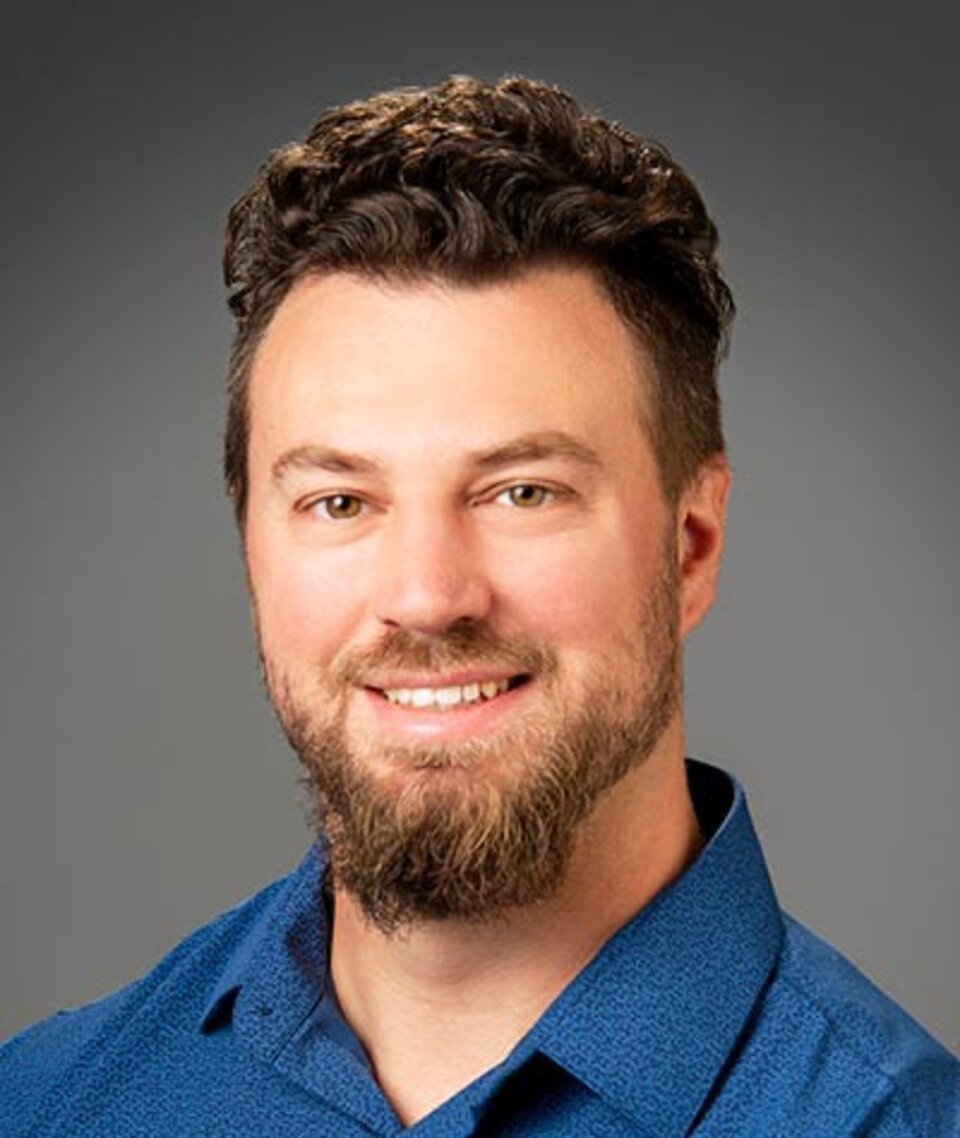Current Student Projects
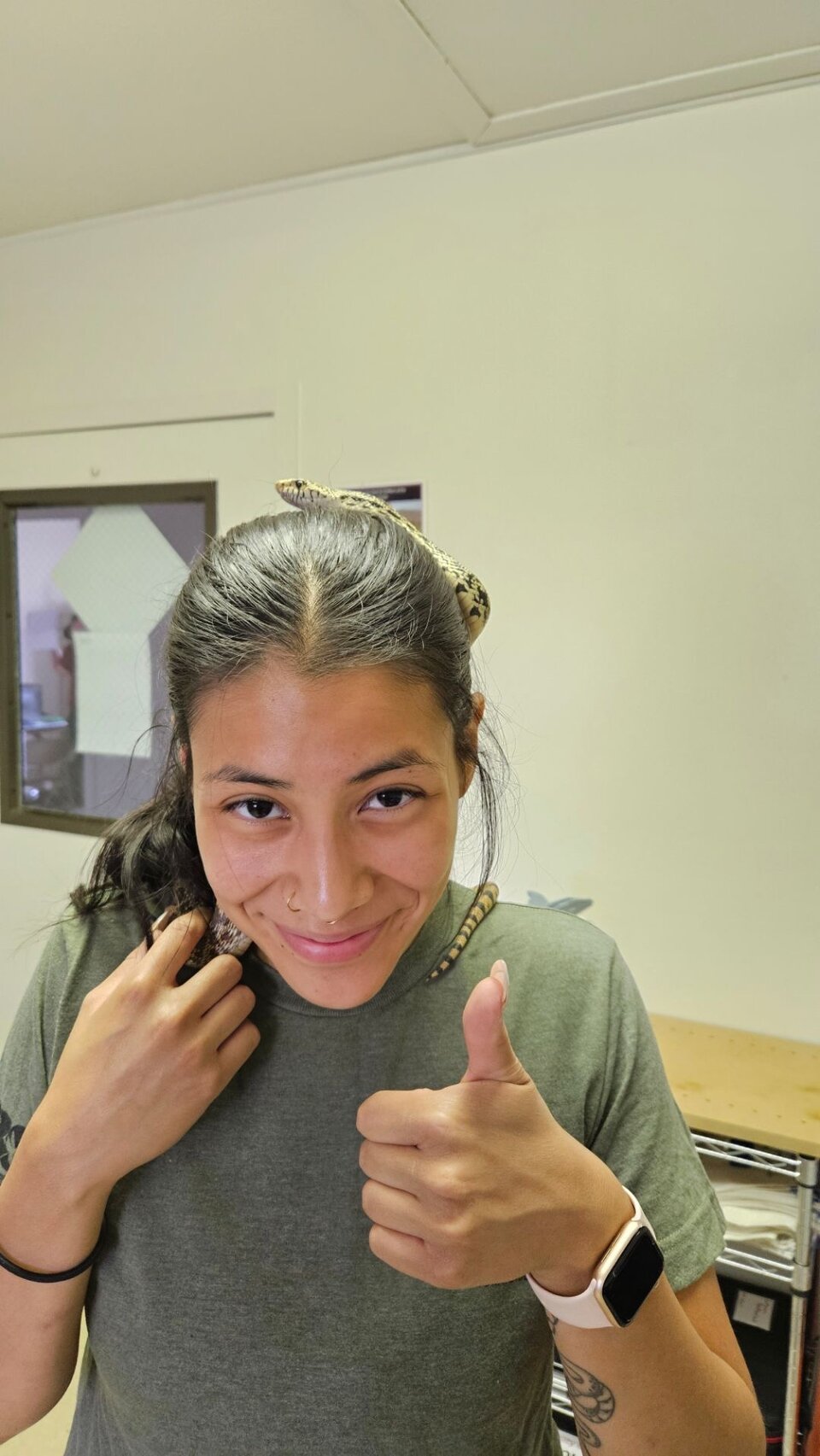
How Climate Change is Affecting the Western Tiger Salamander
By Hendy Ginting
A changing climate has lead to changes in the lengths of certain seasons. With that, many seasonal behaviours of various species will be affected by this. The Western Tiger Salamander (Ambystoma Mavortium) has the ability to leave ponds they inhabit as larvae by metamorphosis. In addition, during cold wintering seasons they will hibernate in the larval stage, under the ice and not metamorphosis. If the wintering season were to decrease, they A. mavortium larvae choose to metamorphosis? A trial is conducted involving 20 A. mavortium. The control group (10 individuals) will experience expected cold temperatures for the expected time period. The experimental group(10 individuals) will experience expected cold temperatures for only 2 weeks before temperatures in their tanks rise to simulate early end to the winter season. Number of metamorphosis events, duration until metamorphosis events, and behaviour will be recorded as well as various environmental parameters. It is predicted that the individuals in the experimental group will have more metamorphosis events, shorter duration until these events, and will be more active.
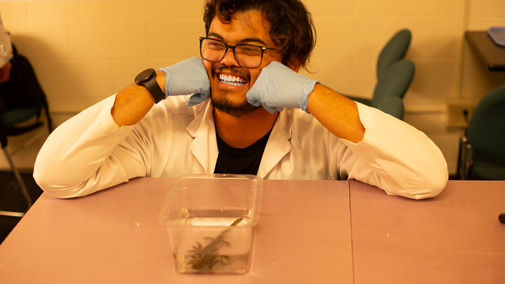
Effects of Dietary Patterns on Growth and Development of American Alligators
By Jordan Wattles
The experiment involves monitoring the growth and feeding behaviors of eight alligator hatchlings under controlled laboratory conditions. Four hatchlings are being fed chicken using tongs, while the remaining four are offered fish and other whole prey items to simulate natural free-will hunting scenarios. Weekly data collection includes weighing and measuring each hatchling, as well as recording the weight of the food provided prior to feeding. This study aims to evaluate the effects of feeding methods and diet types on alligator growth and development.
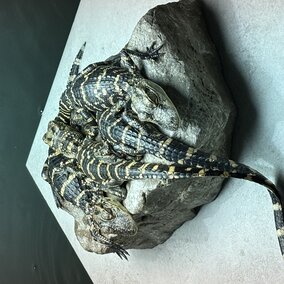
American Alligator Operant Conditioning Study
By Jordan Wattles
In my project I looked at 3 American alligators, a single 1-year-old, in which I conducted a growth study, and two 3-year-olds, in which I began the process of operant condition in order to support voluntary training procedures. During the operant conditioning process I had to change my approach. I originally began looking at the length of time it took for the individuals to respond to the auditory stimulus and I planned to look at how that response time changed over the project. Per Dennis’ request, I changed the project to support a quicker learning process as the individuals were associating any person interacting with them as a feeding time. I began using the auditory stimulus before feeding each individual to associate the food with noise. From there on the individuals no longer bothered others interacting with them.
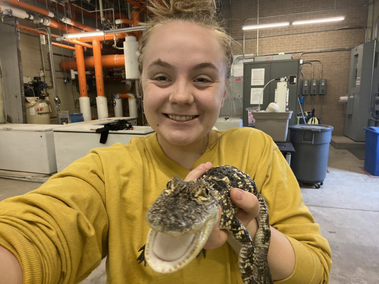
Past Student Projects
Blanding’s Turtle Competition Study
By Caitlyn Copenhaver
I studied and compared the amount of food eaten (as a portion of total body weight) and the amount of competition between 2 juvenile and 2 adult Blanding’s turtles, as well on taking measurements on weight and plastron/carapace length and width.
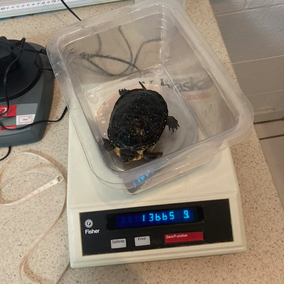
Effects of Environmental Stressors on Amphibian Physiology
By Danielle Galvin
I am currently a PhD candidate at the University of South Dakota. My research focuses on evaluating the effects of environmental stressors on amphibian physiology. More specifically, I am looking at how factors including temperature, drought, selenium contamination, ranavirus, Bd and ectoparasites influence amphibian overwintering physiology, development, immune function, and toxin management. In addition to research, I coordinate local herpetology outreach activities for all ages!
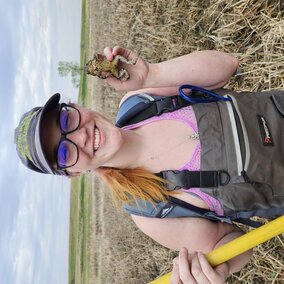
Spatial Ecology of the Pygmy Rattlesnake
By Dylan Maag
After working with Dennis I got my M.S. in Biology at Missouri State University with Dr. Brian Greene. My thesis research was focused on the spatial ecology and habitat selection of the pygmy rattlesnake, Sistrurus miliarius. I continued my education with Dr. Rulon Clark and attended my PhD in Evolutionary Biology from San Diego State University and the University of California, Riverside. My dissertation research focuses on the behavioral and ecological mechanisms underlying differential fitness and their relationship to an individual’s ancestry using a rattlesnake hybrid system (Crotalus scutulatus x viridis).
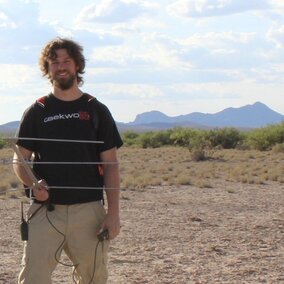
Where Are They Now
Caitlyn Copenhaver
Copenhaver graduated with a Bachelor of Science in Fisheries and Wildlife from the University of Nebraska-Lincoln (UNL) in the spring of 2024. Since that time, she has immersed herself in the field by serving as a Park Worker for the Nebraska Games and Parks Commission, where she has played a vital role in the stewardship of the state’s natural resources and the enhancement of public recreational spaces. In addition, Copenhaver has taken on the responsibilities of Assistant Herbarium Curator at UNL, where she contributes to the curation and management of vital botanical specimens, further enriching her expertise in conservation and biodiversity. Her combined experiences reflect a strong commitment to environmental science and community engagement, positioning her as a dedicated professional in the field.
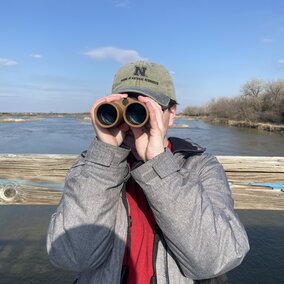
Danielle Galvin
Galvin graduated in 2019 from the University of Nebraska-Lincoln with a Bachelor of Science in Fisheries and Wildlife, laying a strong foundation for her career in biological sciences. She then pursued advanced studies at the University of South Dakota, where she successfully earned her PhD in General Biology in 2023. Since obtaining her Doctor of Philosophy, Galvin has committed her expertise to the role of Postdoctoral Researcher at the University of Tennessee, Knoxville. She has focused her efforts on amphibian conservation in her research at Tennessee and studies the emergence of pathogens and ecotoxicology within amphibians. Her academic journey and ongoing research endeavors underscore her dedication to enhancing our understanding of biodiversity and the complexities of ecological systems.

Dylan Maag
Maag graduated from the University of Nebraska-Lincoln in 2014 with a Bachelor of Science in Fisheries and Wildlife, establishing a strong foundation in conservation biology. He further advanced his education at Missouri State University, earning a Master of Science in Biology in 2017. Maag then pursued and graduated in 2023 with a PhD in Evolutionary Biology through a collaborative program at San Diego State University and the University of California and continued at San Diego as a Postdoctoral Researcher. Today, Maag is an Assistant Professor of Biology in the Department of Life, Earth, and Environmental Sciences at West Texas A&M University (WTAMU). In addition to his teaching and research responsibilities, Maag is the Curator of the Herpetology Collection in the Biodiversity Museum at WTAMU, where he oversees the curation and management of valuable biological specimens. His multifaceted roles reflect a deep commitment to education, research, and the promotion of biodiversity, positioning him as a respected leader in his field.
